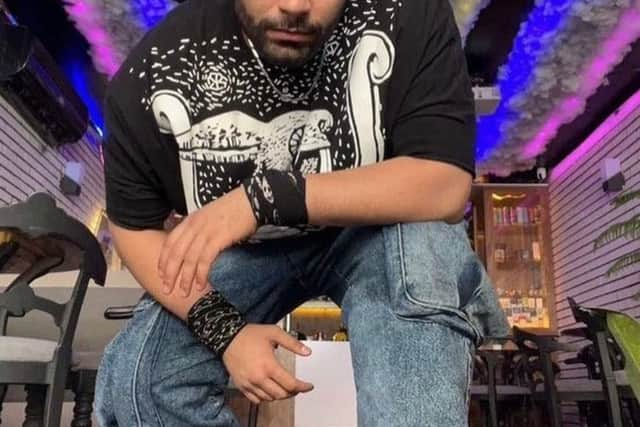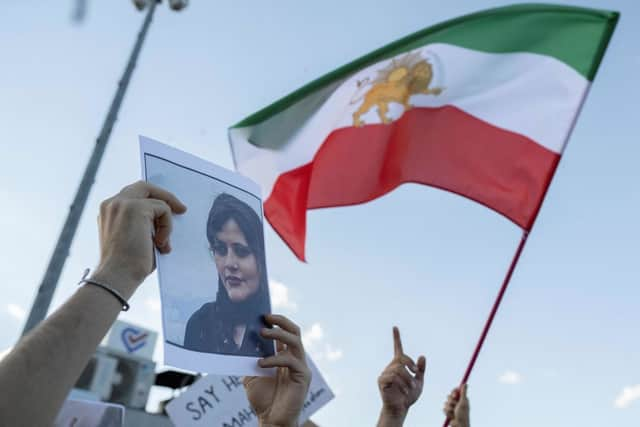Iran: Majidreza Rahnavard publicly hanged from crane in second execution over anti-government protests
and live on Freeview channel 276
Iran has publicly hanged a 23-year-old in its second execution linked to the anti-government protests taking over the country.
In a gruesome warning to others, Majidreza Rahnavard was hanged from a construction crane in the city of Mashhad. He had been convicted of ‘enmity against God’ on account of crimes he allegedly committed during protests against Iran’s strict regime. Officials claimed he had stabbed two members of a paramilitary force after becoming angry about the killing of protesters by security forces.
Advertisement
Hide AdAdvertisement
Hide AdHis family were not told of his execution until after his death, and were instead woken early on Monday (12 December) to be informed that his body had been buried in the local cemetery. According to 1500 Tasvir, an activist account, Mr Rahnavard’s mother was allowed to visit him the day prior to his death but was given no indication of his impending hanging.
The account wrote on Twitter: “She left smiling and hoping that her son would be released soon. This morning she arrived when her son’s murderers were burying his dead body alone.”
Activists have warned that at least a dozen people have already been sentenced to death in closed-door hearings, and that more public executions will follow soon.


Mr Rahnavard’s death, which came just 23 days after his arrest, is the second known execution that has taken place at the hands of Iranian authorities. Mohsen Shekari, 23, was hanged on 8 December after a revolutionary court in Iran found him guilty of “waging a war against God”. Human rights groups however have argued he was convicted after a “show trial without any due process” and “denied access to his lawyer throughout the interrogation phase and legal proceedings.”
Advertisement
Hide AdAdvertisement
Hide AdBBC News reported that Mr Rahnavard too was denied a lawyer of his choice for his trial, and the lawyer he was eventually given did not put up a defence. Iran’s state television also aired a heavily edited report which showed clips of a man, who officials claimed to be Mr Rahnavard, chasing another around a street corner before stabbing him.
The two death sentences come as widespread unrest continues in Iran. Protests erupted in the country when 22-year-old Mahsa Amini died in police custody after being detained for allegedly breaking hijab rules. The police said she died of a sudden heart attack, but her family cast doubt on this and alleged she had been killed.
According to the Human Rights Activists’ News Agency (HRANA), at least 488 people have been killed since demonstrations began in mid-September. Another 18,200 have also reportedly been detained by authorities.


Elika Ashoori, a British Iranian living in London, told NationalWorld: “What is happening to the youth of Iran is nothing short of barbarism. Innocent lives being taken, executed by hanging, and for what? The charges that are being brought on these people don’t have standing in the 21st century. Imagine being sentenced to death for ‘waging war against God’ or ‘spreading corruption on earth’ in sham trials that don’t even take a month from start to finish, with no lawyers, no due process, and no sense of justice.”
Advertisement
Hide AdAdvertisement
Hide AdShe added that the government is playing “sick, twisted mind games” on the victims’ families, citing how Mr Shekari’s family was told his case would be “sent to the appeals court” and Mr Rahnevard’s mother was allowed to visit him in prison the day before his hanging. “These go beyond cruelty,” Ms Ashoori continued. “These are deliberate, sadistic attempts by the Islamic Republic of Iran (IRI) to assert their final morsels of control and fear on society.”
The man in charge of the death sentences in Iran, Judge Salavati, is the same man who sentenced Ms Ashoori’s father Anoosheh Ashoori, who was imprisoned in Tehran on bogus spying charges until earlier in the year. He was released alongside Nazanin Zaghari-Ratcliffe. Ms Ashoori said he is known among prisoners as the ‘judge of death’.
She continued: “This is a pivotal moment for other countries to step in and acknowledge that the IRI is a terrorist organisation and NOT representative of Iranian people. They have taken the people of Iran hostage, carried out mass genocides around the country, and killed men, women, and children as young as 10 years old. I am urging European and Western countries to treat the IRI as what they truly are - a blood thirsty, sadistic, dangerous terrorist organisation.”


Governments around the world have placed sanctions on Iranian court judges and prison officials in the wake of the shocking events - with Jude Salavati sanctioned by the EU and USA for human rights violations. But activists are urging them to do more, putting pressure in particular on companies providing cranes to Iran as they can be used for executions.
Advertisement
Hide AdAdvertisement
Hide AdUK Foreign Secretary James Cleverly today (13 December) wrote on Twitter: “Iran and Russia’s sordid deals threaten global security. We are holding their desperate alliance to account. The UK has just sanctioned high-level Russian and Iranian figures in response to the abhorrent strikes against civilian targets.”
Meanwhile, Germany’s Foreign Minister Annalena Baerbock described the execution as “a blatant attempt at intimidation” of Iranians, while EU foreign policy chief Josep Borrell confirmed “we are going to approve a very, very tough package of sanctions.”


“In the absence of serious measures to deter the Islamic Republic from executing protesters, we will be facing even more horrific crimes like the 1980s mass execution of political prisoners,” Oslo-based group Iran Human Rights warned on Monday (12 December), in a reference to the 1988 executions in part overseen by Iran’s current hard-line President Ebrahim Raisi. Activists believe as many as 5,000 inmates were put to death during this time.
Amnesty International has also said it obtained a document signed by one senior Iranian police commander asking that the execution for one prisoner be “completed ‘in the shortest possible time’ and that his death sentence be carried out in public as ‘a heart-warming gesture towards the security forces’.”
Comment Guidelines
National World encourages reader discussion on our stories. User feedback, insights and back-and-forth exchanges add a rich layer of context to reporting. Please review our Community Guidelines before commenting.
